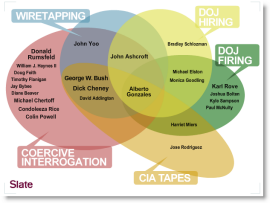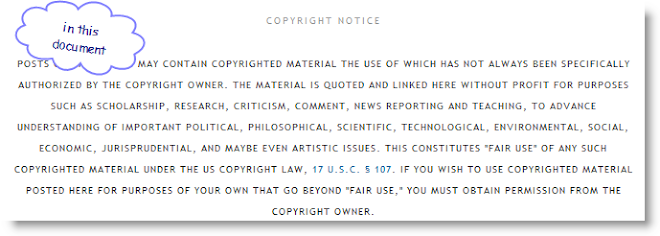[I]n late June [US Attorney General Eric] Holder asked an aide for a copy of the CIA inspector general's thick classified report on interrogation abuses. He cleared his schedule and, over two days, holed up alone in his Justice Department office, immersed himself in what Dick Cheney once referred to as "the dark side." He read the report twice, the first time as a lawyer, looking for evidence and instances of transgressions that might call for prosecution. The second time, he started to absorb what he was reading at a more emotional level. He was "shocked and saddened," he told a friend, by what government servants were alleged to have done in America's name. When he was done he stood at his window for a long time, staring at Constitution Avenue. [p.4]
Saturday, July 11, 2009
Rule of Law
Friday, July 10, 2009
Joint IG Report re B43 Domestic Surveillance
Bush Administration domestic surveillance programs much broader than previously known. Spencer Ackerman has more. Here's the joint report from the inspectors general [& with bookmarks].
We're going through the report now, but for a frame of reference let me refer you back to this TPMmuckraker report by Paul Kiel and Spencer Ackerman from two Julys ago. I dare say we were on to something.
2009.07.10_Joint_IG_Report_B43Surveillance

2009.07.13 David Corn
. . .. ... .. . .
Bush | Gonzales | Card | Ashcroft | Hospital | Comey
Wednesday, July 08, 2009
B43 Justice

& WaPo
& TPM
The news that Karl Rove has finally testified before lawyers for the House Judiciary committee about his role in the US Attorney firings and the prosecution of Don Siegelman represents, in one sense, the culmination of years-long battle. That fight has pitted Congress, determined to get to the bottom of the firings, against the Bush White House, which has dragged its feet at virtually every stage. And yet, the path from here to a full public accounting of what happened remains unclear at best.
Rove's deposition put a cap on a protracted legal standoff between the committee, chaired by Rep. John Conyers (D-MI) and the Bush White House. Conyers, investigating the late 2006 firing of nine US Attorneys, had first subpoenaed Rove in 2007. Citing executive privilege, the White House refused to let Rove testify. That eventually prompted Congress to hold Rove in contempt, and ultimately to file a lawsuit seeking to compel Rove to testify. A district court ruled in Congress's favor last year, but the White House appealed that ruling, and Rove continued to be a no-show at several committee hearings to which he had been called to testify. Eventually, in March, lawyers for President Bush reached an agreement with the committee, securing Rove's and Harriet Miers' testimony. Even since then, though, it's taken over four months to arrange for Rove's sit-down. (Miers had hers last month.) ....
Tuesday, July 07, 2009
Official Google Blog: Introducing the Google Chrome OS
It's been an exciting nine months since we launched the Google Chrome browser. Already, over 30 million people use it regularly. We designed Google Chrome for people who live on the web — searching for information, checking email, catching up on the news, shopping or just staying in touch with friends. However, the operating systems that browsers run on were designed in an era where there was no web. So today, we're announcing a new project that's a natural extension of Google Chrome — the Google Chrome Operating System. It's our attempt to re-think what operating systems should be.
Google Chrome OS is an open source, lightweight operating system that will initially be targeted at netbooks. Later this year we will open-source its code, and netbooks running Google Chrome OS will be available for consumers in the second half of 2010. Because we're already talking to partners about the project, and we'll soon be working with the open source community, we wanted to share our vision now so everyone understands what we are trying to achieve.

Speed, simplicity and security are the key aspects of Google Chrome OS. We're designing the OS to be fast and lightweight, to start up and get you onto the web in a few seconds. The user interface is minimal to stay out of your way, and most of the user experience takes place on the web. And as we did for the Google Chrome browser, we are going back to the basics and completely redesigning the underlying security architecture of the OS so that users don't have to deal with viruses, malware and security updates. It should just work.
Google Chrome OS will run on both x86 as well as ARM chips and we are working with multiple OEMs to bring a number of netbooks to market next year. The software architecture is simple — Google Chrome running within a new windowing system on top of a Linux kernel. For application developers, the web is the platform. All web-based applications will automatically work and new applications can be written using your favorite web technologies. And of course, these apps will run not only on Google Chrome OS, but on any standards-based browser on Windows, Mac and Linux thereby giving developers the largest user base of any platform.
Google Chrome OS is a new project, separate from Android. Android was designed from the beginning to work across a variety of devices from phones to set-top boxes to netbooks. Google Chrome OS is being created for people who spend most of their time on the web, and is being designed to power computers ranging from small netbooks to full-size desktop systems. While there are areas where Google Chrome OS and Android overlap, we believe choice will drive innovation for the benefit of everyone, including Google.
We hear a lot from our users and their message is clear — computers need to get better. People want to get to their email instantly, without wasting time waiting for their computers to boot and browsers to start up. They want their computers to always run as fast as when they first bought them. They want their data to be accessible to them wherever they are and not have to worry about losing their computer or forgetting to back up files. Even more importantly, they don't want to spend hours configuring their computers to work with every new piece of hardware, or have to worry about constant software updates. And any time our users have a better computing experience, Google benefits as well by having happier users who are more likely to spend time on the Internet.
We have a lot of work to do, and we're definitely going to need a lot of help from the open source community to accomplish this vision. We're excited for what's to come and we hope you are too. Stay tuned for more updates in the fall and have a great summer.
Posted by Sundar Pichai, VP Product Management and Linus Upson, Engineering Director





